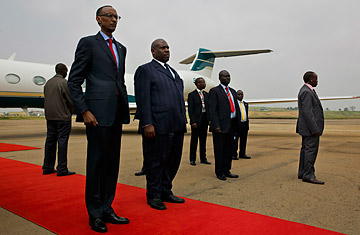
Uganda, Entebbe, 2012. President of the Republic of Rwanda Paul Kagame arrives in Uganda to take part in the a Great Lakes summit, joins the host President Yoweri Museveni, DRC's Joseph Kabila and other East African Head of State's, to discuss the insecuritues in Eastern Congo.
(5 of 5)
Congo exemplifies Kagame's argument with the West. The West sees Africa as incapable and in need of help, what Kagame calls "that old attitude of looking at Africa as people who must be got in shape." The reality, he says, is that the international community often blunders in Africa while Africa is increasingly taking care of itself.
And indeed, the continent today is more democratic, less aid-dependent and less awed by a recession-battered West than ever before. African economic growth fell below 5% just once in the past decade. (By contrast, the U.S. last saw growth of 5% in 2006 — and that was an unusually good year for the world's largest economy.) African Union troops are restoring government to Somalia, the world's worst failed state, after 21 years of Western failure to do the same. Yet a world community structured to expect only disaster from Africa fails to recognize this rising Africa. At a time when 10 million Rwandans are experiencing rising incomes that increase their freedoms and choices, Rwanda's image is often defined by press releases from a foreign organization, Human Rights Watch, whose remit is only ever to point out the bad. "Isn't this a bit unfair?" asks Kagame.
What's more, he says, it's actually a contradiction. "If you are really talking about freedoms, then why not listen to me? Are you not committing the same offense you accuse me of?" It's a point that attracts sympathy from a surprising quarter. "If he's saying the world is unfair, yes, that's true," says Human Rights Watch's Roth. "We tried to put pressure on the U.S. because of [President George W. Bush's] use of torture, and it was hard. Rwanda is not as powerful as the U.S. and, yes, is more susceptible to pressure."
At home for lunch with his wife Jeannette and four children, Kagame elaborates on how anger at Western double standards is spreading in Africa. It is that spirit of African assertion that powers an increasing consensus that the new Africa will not be a collection of copies of Western liberal democracies or even Asian centralized states but something uniquely African: a group of highly devolved states with fluid borders to better suit Africa's tribes. It is also driving a proposal for a 4,000-strong force of African soldiers to be stationed in eastern Congo. The proposal is on the table at an 11-nation International Conference on the Great Lakes (ICGLR) in Kampala in August to which I follow Kagame. Due to be at the meeting are many of the Western officials with whom Kagame is at odds.
African Union
At the summit in Kampala, the idea of an African force for Congo attracts derision from Western diplomats. "Who's going to pay for it?" says one. "How effective could it be?" Monusco's Meece is more tactful: "We want to be as supportive of the ICGLR as we can." But Meece is missing the point: the proposed ICGLR force is specifically aimed at replacing Monusco, not supplementing it or working under its aegis. It is time, Kagame believes, for the West to acknowledge its failure in Congo and to step aside to let Africans take care of the problem. "Is this any way to run the world?" he asks, referring to the situation in Congo.
Kagame's views are warmly welcomed by his fellow African leaders at the summit. He is not the only regional leader to express disdain for Western efforts in Congo. In response to a query about working with the U.N., Ugandan President Museveni interjects, to raucous laughter: "Please. Don't disturb their holiday."
I see Kagame for the last time in his hotel room during a break in talks. He seems pleased. "The old way of doing things is weakening. The international community have always just parachuted in here and meddled with things they do not understand. Now, at least in principle, people are taking responsibility for what they should." As ever with Kagame, there is a sense of more battles to come. The thought doesn't tire him. "I think my life really prepared me for this," he says. "I never feel like I want to run away from a problem. I just want to get up and move towards it."
It's typical Kagame. It is also a reminder of why he is often taken for a tyrant. The price of pragmatism is principle, and Kagame readily confesses to expediency. Political freedom is allowed in Rwanda, he tells me in an earlier interview, unless there is the slightest possibility that someone might be plotting genocide, at which point "they are going to find out that we are not very kind." In an e-mail interview, Tony Blair says such displays of iron resolve should not be misinterpreted. "I think people do get him wrong," he writes. "What I see in President Kagame [is] this impatience for a new Africa, not some throwback to an authoritarian past."
If Kagame's is a fight to bury the old Africa and forge a new one, remade as free and equal, then a judgment on him also comes down to whether it is made with an eye fixed on Africa's past or its future. Kagame straddles old and new Africa. He was made by Africa's bloody past. As a boy, then a rebel, he saw repeated, intentional human catastrophe. Those experiences prompted some dark conclusions about people and about how to survive in a world where human decimation is possible. They also invested him with an unparalleled determination to forge a better future for Africa. And nobody is going to do it for him.
